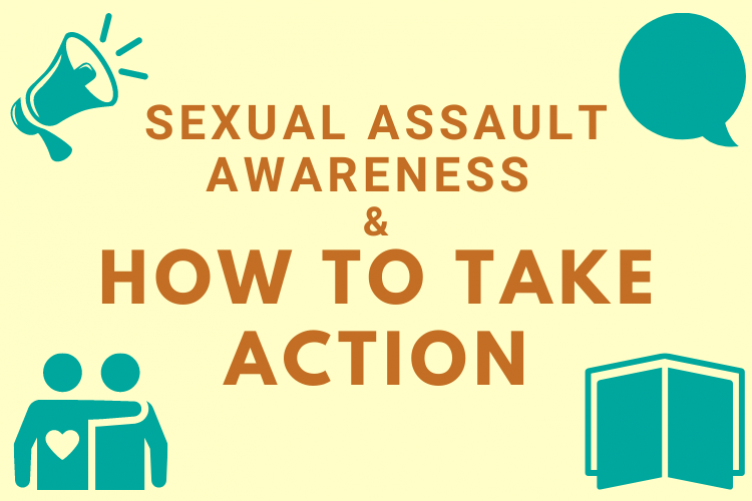
This April marks the 20th official Sexual Assault Awareness Month, though activists have been working to raise awareness of this issue for even longer. Why do we focus on awareness? Why is it important that the average person learn more about the issue of sexual assault and interpersonal violence? Essentially, awareness is so important because sexual violence does not exist in a vacuum. Anyone can be impacted by it, and there is a cultural component contributing not only to the violence, but also to how people react to it. If we wish to prevent sexual assaults, then the general public needs adequate and accurate information.
Another important aspect of raising awareness around sexual violence is giving people information that will allow them to treat survivors in more compassionate and supportive ways. Many survivors have experienced additional harm after the assault from individuals and systems which have treated them in hurtful, shaming, or dismissive ways. Even well-intentioned individuals may not know an appropriate way to help a survivor.
Additionally, widely available and accurate information about sexual assault, consent, and available resources eases the burden on survivors. Those who have been exposed to such information would be better equipped to begin healing in whichever ways they choose. Survivors of sexual violence often feel isolated and ashamed. If they are more aware of the prevalence of sexual violence, and hear stories from other survivors, they can know that they are not alone. They could draw strength from communities of survivors and learn from the experiences of others who are recovering after sexual assault.
However, simply knowing that sexual assault is an issue is one thing. Doing something about it is another. How can you take action? Here are some ideas.
Ways to Take Action
Educate Yourself
Being informed is an ongoing journey, and there is always more to learn. You've already taken a good step by reading this article! You can read books, watch documentaries, and listen to podcasts which discuss sexual violence (particularly those which center survivors' voices). For reading suggestions, check out SHARPP's Goodreads shelf. Also, follow SHARPP and related organizations on social media, and read relevant blogs and news articles. The SHARPP webpage is a good starting point if you are looking to read more about the subject. Remember to get your information from a diverse set of sources. Survivors of color, queer survivors, disabled survivors, and survivors who hold other marginalized identities all have important contributions to the conversation which should not be ignored. Learning about these topics can be intense, and certain resources may be triggering for some people. Be sure to take care of yourself and recognize your own capacity.
Practice and Model Consent
As you become more knowledgeable about the reality of sexual assault, you can also put your knowledge about consent into practice, in all areas of your life. While consent is often brought up in the context of sexual situations, this is not the only context in which it is relevant. You can practice consent by asking about and being respectful of someone's boundaries, whether they be physical, emotional, or otherwise. For example, you might ask before hugging someone. Or you could start a conversation about something intense or potentially triggering by ensuring that whoever you are conversing with is alright with discussing the topic.
Challenge Myths
Misinformation and misconceptions about sexual violence and survivors are unfortunately common in today's world. You can challenge these myths whenever you encounter them. This could be as simple as saying, "that doesn't sound right to me," and pointing the other person to a reliable resource to correct their misconception. Or perhaps it might involve saying, "that isn't funny," to a joke which belittles the seriousness of sexual violence. It only takes one person to challenge an inconsiderate remark. You might even be making others in the room feel safer as a result.
Engage in Activism
Finally, you can engage in activism which makes the world around you more just for survivors. This could be at a global, national, or state level. However, it could just as easily be within a community such as a town, school, or workplace. While dedicating much time and effort to such a cause is wonderful, you don't have to be engaging at such a level to help. Sometimes, activism can be as simple as using your own position in the community to effect small changes. For example, you may be able to encourage more education around the subject of sexual violence, or perhaps the implementation of trauma-informed practices.
Learn How to Support Survivors
One way to support survivors of sexual violence is to support those survivors who may disclose their experience to you. Although it is difficult for many people to imagine a loved one going through this type of violence, it is more likely than many people realize. When survivors disclose, they predominantly choose to tell someone close to them (whether that is a friend, family member, or loved one). Learning how to respectfully respond to a disclosure of sexual violence can make a big difference in the lives of survivors. It is most important that you believe them, listen without judgment, and respect their decisions. For more details on how to support a survivor, visit SHARPP's page on helping a friend.
Remember, these are just a few suggestions; you may find only some of these are achievable for you. Or maybe you have your own unique ways to help! Awareness is an ongoing process, and it is never too late to start learning.
-
Written By:
Carolyn Stoller | SHARPP



















































